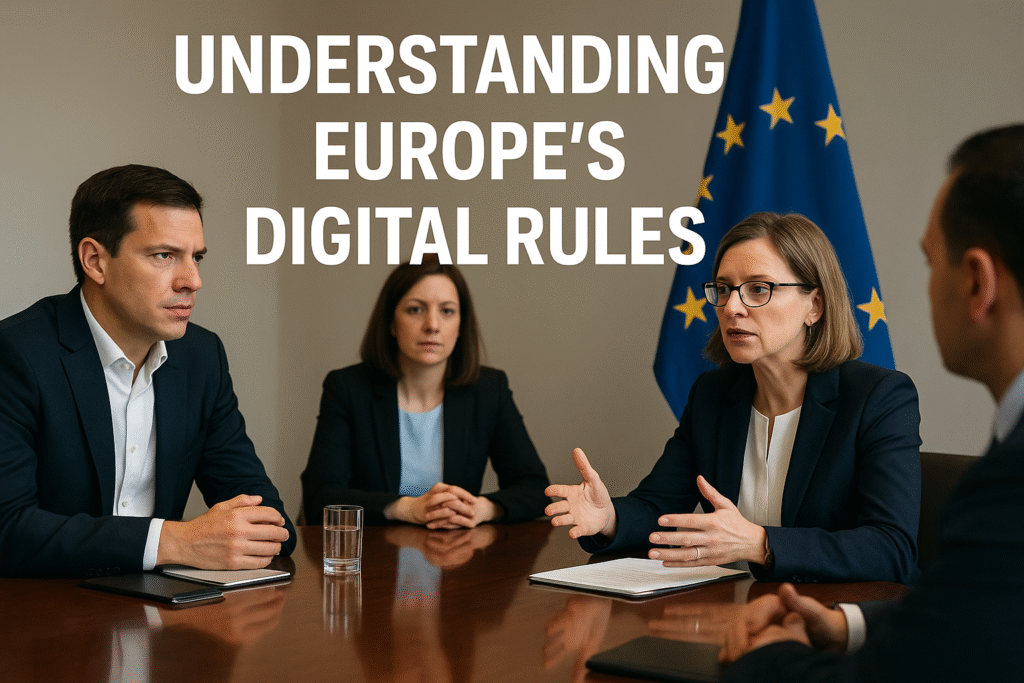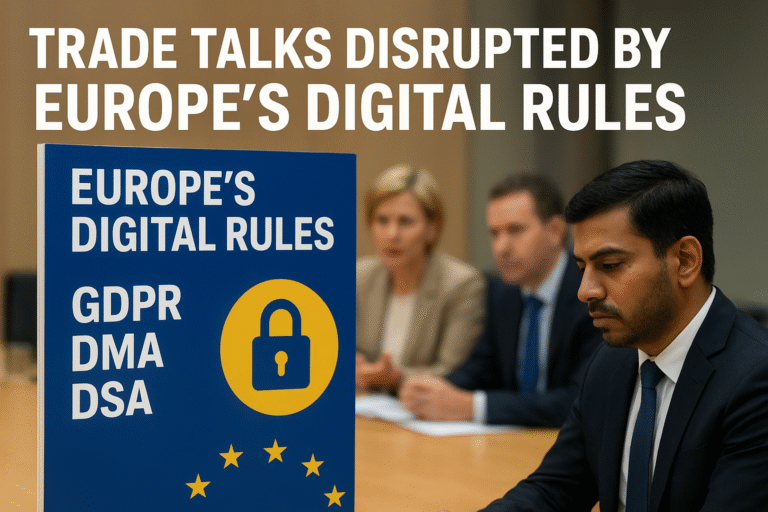Premium Biz Post – Global trade has always been shaped by rules, regulations, and evolving policies. Yet, in today’s digital age, it’s not just tariffs or customs that influence negotiations—it’s also data governance, online market access, and strict digital regulations. Recently, trade talks between international partners were disrupted due to Europe’s digital rules, sparking debates on how these policies affect business, innovation, and cross-border cooperation. But what exactly caused this halt, and what are the real-world consequences?
This article explores the background of Europe’s digital regulations, why they disrupted trade discussions, and what ripple effects businesses, governments, and consumers may face.
Understanding Europe’s Digital Rules
Europe has long positioned itself as a global leader in regulating the digital economy. The European Union (EU) emphasizes protecting consumers, safeguarding privacy, and curbing the dominance of tech giants. Key frameworks include:
- GDPR (General Data Protection Regulation): A strict set of data privacy laws that influence how companies handle user information.
- DMA (Digital Markets Act): Aimed at limiting the monopolistic behavior of major digital platforms.
- DSA (Digital Services Act): Focused on content moderation, transparency, and online safety.
While these rules are praised for protecting user rights, they also create compliance challenges for foreign companies trying to access Europe’s market. This balancing act between digital sovereignty and global trade openness lies at the center of halted negotiations.

Why Trade Talks Were Halted
Trade talks often depend on finding common ground—especially when it comes to standards and regulations. The recent pause occurred because Europe’s digital framework clashed with other nations’ approaches, particularly those advocating freer data flows and less regulatory oversight.
Key sticking points included:
- Data Flow Restrictions
Europe’s insistence on limiting how data is transferred outside the EU has frustrated trading partners. Nations reliant on cross-border data exchange view this as a barrier to innovation and global cooperation. - Fair Competition Concerns
The DMA places strict obligations on tech companies considered “gatekeepers.” Some trade partners see this as unfair targeting of U.S. and Asian digital giants, sparking tensions. - Regulatory Alignment
Unlike tariffs, digital rules are harder to harmonize. Europe’s strong focus on consumer protection often conflicts with nations prioritizing rapid digital expansion and fewer restrictions.
As a result, negotiations stalled—not due to lack of interest in trade, but because digital policy has become a new battleground in global commerce.
The Broader Economic Impact
When trade talks stop, the consequences ripple across multiple layers of the global economy. The immediate impact of Europe’s digital rules can be seen in several ways:
1. Businesses Face Uncertainty
Companies operating in both Europe and other regions now face higher compliance costs. Multinationals may need to redesign data systems, legal frameworks, and supply chains to align with EU standards. This uncertainty makes businesses hesitant to expand or invest.
2. Innovation Slowdown
Startups, especially in developing markets, find it difficult to meet Europe’s stringent requirements. Instead of fostering innovation, these rules may discourage smaller players from entering the European market, giving established firms an advantage.
3. Strained International Relations
When digital regulations halt trade talks, political trust is tested. Countries may retaliate with their own rules or tariffs, leading to a fragmented global digital economy.
4. Consumers Feel the Effects
While European citizens may benefit from stronger privacy protections, they could also face reduced access to foreign services, slower adoption of new technologies, and potentially higher costs as companies adjust pricing.
read more : “Wall Decorations Small Touches That Make a Big Impact“
Who Wins and Who Loses?
The halt in trade talks is not entirely negative. It creates both winners and losers:
- Winners:
- European consumers gain stronger digital protections.
- European policymakers strengthen sovereignty and control over Big Tech.
- Local European tech firms may face less competition from global giants.
- Losers:
- Non-EU companies trying to enter or expand in Europe.
- Startups and SMEs that lack resources to comply with complex rules.
- Global trade relations, which become increasingly fragmented.
This duality shows that while the EU seeks to protect its citizens, its rules have unintended global consequences.
Long-Term Outlook: Is a Compromise Possible?
History suggests that trade negotiations, no matter how tense, often resume once compromises are found. The question is whether Europe will adjust its stance or whether other nations will adapt.
Several scenarios could unfold:
- Global Standards Emergence
If the EU’s rules gain traction, they may set a global benchmark—just as GDPR influenced privacy laws worldwide. Other nations might eventually align with Europe. - Bilateral Agreements
Instead of broad global deals, smaller, bilateral agreements could emerge where countries negotiate tailored solutions for digital trade. - Digital Trade Fragmentation
In the worst-case scenario, we may see a fractured digital economy where different regions enforce incompatible rules, making cross-border business harder.
Each path carries significant consequences for global trade, innovation, and consumer access.
Lessons for Businesses and Policymakers
The halt in trade talks highlights one central reality: digital rules are no longer peripheral—they are core to global trade negotiations. Businesses and governments alike must adapt to this new era.
- For Businesses:
Companies must prepare for stricter compliance environments and diversify their markets. Investing in legal expertise and data governance frameworks is now essential. - For Policymakers:
Leaders must recognize that protecting digital rights is crucial, but so is maintaining trade openness. Finding middle ground will be key to avoiding economic fragmentation. - For Consumers:
Citizens need to understand the trade-off between digital protection and market access. Awareness helps shape democratic debates around digital policy.
The Impact of Europe’s Digital Rules on Global Trade
The pause in trade talks caused by Europe’s digital rules is more than a temporary setback—it’s a reflection of the growing importance of digital policy in global trade. These rules highlight Europe’s determination to lead in consumer protection and fair competition, but they also raise questions about global cooperation, innovation, and market access.
The impact is multifaceted: businesses face rising costs, consumers gain protections but risk reduced access, and international relations grow more complex. Whether this moment sparks greater global alignment or entrenches digital divides will depend on how policymakers respond in the months ahead.



